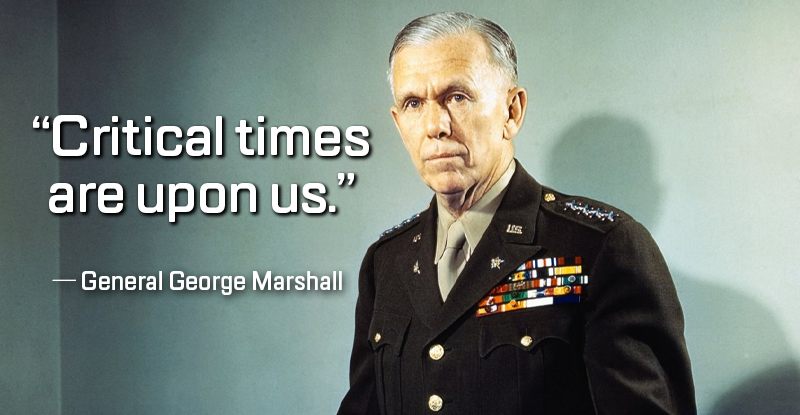By Forrest L. Marion, Ph.D.
Retired U.S. Air Force officer and military historian
On 1 September 1939 – the day Hitler invaded Poland to begin the Second World War – George C. Marshall officially took the reins as chief of staff of the United States Army. Marshall was to lead the Army through the entirety of the war.
For the next two years, however, as Hitler’s military overran most of Europe and threatened Great Britain’s survival, General Marshall devoted himself to preparing the peacetime army “if war came” – a war many Americans still hoped desperately to avoid.[i]
During the First World War, culminating as the First Army’s assistant chief of staff for operations, Marshall had witnessed the problem of field commanders who were past their prime.
Marshall’s biographer, noted military historian Forrest Pogue, wrote that in 1939-1941 Marshall “was haunted by recollections of the droves of unfit commanders” that Pershing had sent to reclassification because they “no longer had it.”
Marshall himself wrote, “Men who had sustained a reputation for soldierly qualities, under less trying conditions, proved too weak for the ordeal and became pessimistic calamity howlers.”[ii]
In the two decades of bare-bones funding between the wars, Marshall “fought the dead hand of promotion by seniority.”
Finally in a position to do something about the seniority system, as the army expanded in 1940 and ‘41 Marshall built a command system “to be able to put my finger on the man I wanted” for particular leadership posts.
Pogue wrote, “. . . he was preparing an army for war and felt that the selection of those who could lead in battle was a duty he owed the state.”
To ensure impartiality in the process of eliminating unfit senior officers from consideration for higher-level and combat commands, Marshall appointed six retired officers, headed by his predecessor, General Malin Craig.
Marshall’s “plucking board,” as it was called, was “empowered to remove from line promotion any officer for reasons deemed good and sufficient.” Those removed were given one year to retire. As Marshall told the board, “Critical times are upon us.”
So, it is today.
As in 1940, the United States faces increasingly threatening rogue actors abroad, led by China – including its space forces – and a host of lesser would-be aggressors.
Anyone paying attention knows that U.S. combatant commands might be called upon to protect national security interests on very short notice. But as countless military historians and others have observed, leadership remains the key to military success, or failure.
The last American general to orchestrate a strategic victory in a real war, Marshall was lauded by Churchill as the Allies’ “true ‘organizer of victory.’”
The sole reason Marshall was not tasked by President Roosevelt to command the 1944 Allied invasion of northwest Europe was due to his broad grasp of the strategic situation not only in Europe, but worldwide. As FDR told him, “I didn’t feel I could sleep at ease if you were out of Washington.”
Unless an unlikely up-and-coming Marshall appears to shake things up, a serious Department of Defense – which has proven itself utterly unserious since 2021 – must take the initiative to change its course:
- reordering priorities;
- reestablishing proven standards and culture;
- restoring military competency and merit-based advancement; and
- rebuilding the trust of the American public.
These are indispensable components which have been upset, dangerously degraded, or threatened by the social justice/woke revolution that has ravaged the country to incalculable loss, aided and abetted by an unserious administration in Washington.
In June 2023, the Chinese took their measure of American leadership and declined to meet with U.S. Secretary of Defense Austin at the Shangri-La Dialogue Asian security summit in Singapore. In another era, such a rebuff was unthinkable.
A plucking board must be one element if U.S. defense restoration is to take place.
Why? Simply this: since the Pentagon began mandating leftist, racist Critical Race Theory (CRT)-based ideological indoctrination under the term DEI and, in the process, diverting precious resources from legitimate combat readiness in favor of utopian foolishness, no U.S. senior military leader is known to have done what Air Force chief of staff Gen. Ron Fogleman did a generation ago.
In 1997, Fogleman – universally admired and respected by those who know him – resigned on principle due to the scapegoating of an Air Force one-star who was blamed for the Khobar Towers attack in 1996.
Twenty-five years later, a safe estimate is that near-zero general/flag officers resigned on principle when the Biden Pentagon implemented its morale-lowering and combat readiness-degrading initiatives within the now-dwindling ranks.
Sadly, dozens of examples could be brought forward which demonstrate similar ideological indoctrination of the armed forces, directly or indirectly.
One telling case, however, occurred in May 2021 when Secretary Austin fired a lieutenant colonel who dared to challenge the department’s CRT/DEI-based mandates. Prior to investigating, Austin relieved the officer on grounds of participating in “prohibited partisan political activity.”
Following the firing, Sen. Roger Wicker (R-Miss.) wrote to Secretary Austin to express his concerns:
If the Department of Defense finds that . . . statements on CRT qualify as a “partisan cause,” it would then follow that the Department recognizes CRT itself as reflecting one side in a partisan debate.
Yet if CRT is partisan, it must be asked why this ideology is increasingly being pushed on U.S. service members.
It has become increasingly clear that the Department is actively pushing CRT through “diversity and inclusion” trainings, recommended reading materials, and cadet instruction.
The Department therefore cannot call . . . statements on CRT “partisan” without being implicated in the same partisan advocacy.
When queried, Wicker’s staff found no record of a response from the Secretary. No surprise, because Wicker had nailed them.
Similar to a number of serious thinkers during these “critical times,” one writer at the Center for the American Way of Life observes rightly,
“A military consumed by politics and identity threatens the very integrity of our republic.”
In the above firing and a host of other cases in recent years, every senior officer who failed to push back in some way – up to resigning as General Fogleman did – has proven complicit in the degrading of U.S. military combat readiness and morale.
Each one who remained silent contributed to the ongoing recruiting crisis fueled by the Pentagon’s ideologically-driven contempt toward white males, who – like it or not – historically sustain the vast majority of U.S. combat losses during hostilities.
Understandably, many traditionally serving American families have discouraged their young men from joining a military whose leaders have proven themselves complicit in, 1), viewing white males as suspected extremist-racists, and 2), undermining the military’s warrior ethos.
To borrow the term of Marshall’s day, such complicit officers are unfit.
A modern-day plucking board, examining each record, might aim to retire up to 1/3 of each senior officer cohort 120 days apart, perhaps beginning with current three- and four-stars.
In one year’s time (three boards), the DEI-complicit in a given cohort could be headed toward retirement – or, into the DEI Industrial Complex where they belong – making room for the merit-based advancement of actual leaders.
Something along this line is required for a future chief of staff or defense secretary to be able to put his “finger on the man . . . wanted,” as did Marshall with the support of his boss, Secretary of War Henry Stimson.
As in Marshall’s day, the selection of those capable of leading in battle remains “a duty . . . owed the state.”
Prior to battle, however, another duty owed, is leaders worthy of the trust of families to send their young men into service. To meet these sober obligations, a requisite plucking awaits.
Forrest L. Marion is a retired Department of the Air Force military historian; his most recent works are Flight Risk: The Coalition’s Air Advisory Mission in Afghanistan, 2005-2015 (Naval Institute Press, 2018) and Standing Up Space Force: The Road to the Nation’s Sixth Armed Service (Naval Institute Press, 2023).
Notes:
[i] Most information on Marshall contained herein taken from Forrest C. Pogue, George C. Marshall: Ordeal and Hope (New York, 1965), chapter IV; and his George C. Marshall: Organizer of Victory (New York, 1973), chapter XVI.
[ii] George C. Marshall, Memoirs of My Services in the World War, 1917-1918 (Boston, 1976), 175-76.
First published in Real Clear Defense
Asked what advice he would give to a young officer going to war, VMI graduate General Marshall wrote the following to a VMI professor:
To be a highly successful leader in war four things are essential, assuming that you possess good common sense, have studied your profession and are physically strong.
When conditions are difficult, the command is depressed and everyone seems critical and pessimistic, you must be especially cheerful and optimistic.
When evening comes and all are exhausted, hungry and possibly dispirited, particularly in unfavorable weather at the end of a march or in battle, you must put aside any thought of personal fatigue and display marked energy in looking after the comfort of your organization, inspecting your lines and preparing for tomorrow.
Make a point of extreme loyalty, in thought and deed, to your chiefs personally; and in your efforts to carry out their plans or policies, the less you approve the more energy you must direct to their accomplishment.
The more alarming and disquieting the reports received or the conditions viewed in battle, the more determined must be your attitude. Never ask for the relief of your unit and never hesitate to attack.
(GCM to BG John S. Mallory, Nov. 5, 1920, GCM Papers, 1: 202-3.)








Leave a Comment